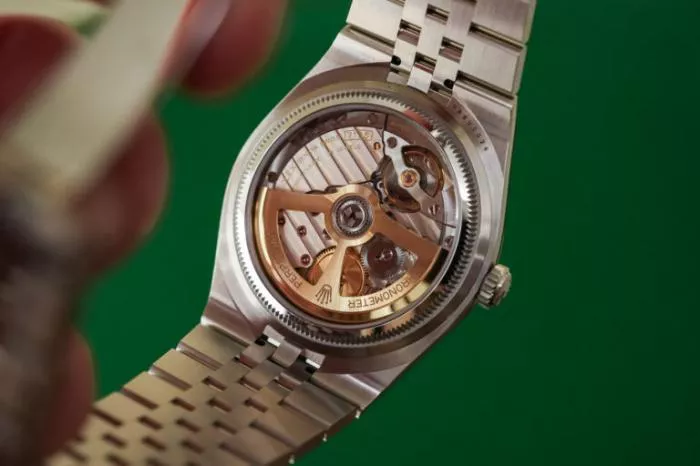In a bold departure from its incremental innovation strategy, Rolex has introduced a horological breakthrough with the Dynapulse escapement inside its new Calibre 7135. Debuted at Watches and Wonders 2025, this engineering feat marks one of the most significant technical advancements in the brand’s history—challenging long-held assumptions about precision, energy efficiency, and industrial-scale production.
The Anatomy of Innovation
Contrary to early speculation fueled by patent filings, the Dynapulse escapement is neither a Swiss lever nor a natural escapement. Instead, it represents an entirely new architecture: a double-wheel, indirect-tangential impulse system crafted primarily from silicon. Frank Vernay, Rolex’s head of movements, describes it as a “sequential distribution escapement” delivering 30% greater efficiency than traditional lever escapements while maintaining compact dimensions. Operating at 5Hz (36,000 vibrations per hour), it achieves higher accuracy without increasing energy consumption—a feat verified by its 66-hour power reserve, matching Rolex’s 4Hz Chronergy-equipped movements.
Master watchmaker Karsten Fraessdorf highlights the escapement’s radical geometry as key to its performance. “With just six teeth per wheel—versus the typical 15–20—Rolex minimized centrifugal forces and inertia,” he explains. The design eliminates sliding friction through convex-tooth profiles and a rolling-contact mechanism, enabled by deep-reactive ion etching (DRIE) for nanoscale polishing. Seven patents protect these innovations, including the escapement’s impulse rocker, which replaces direct balance-wheel engagement with an intermediary energy-transfer system.
Beyond the Escapement: A Regulating Organ Revolution
The Calibre 7135 extends its innovation beyond the escapement. A ceramic balance staff, polished to nanometric smoothness, enhances durability and reduces pivot friction. The free-sprung balance wheel uses a proprietary lead-free brass alloy (CuZn21Si3P) for improved antimagnetic properties, while a redesigned Syloxi silicon hairspring—with thickened coils and dual anchor points—accommodates the 5Hz frequency. Paraflex shock absorbers with reinforced leaf springs further optimize resilience.
Rolex’s emphasis on industrial viability sets the Dynapulse apart. Unlike artisanal natural escapements, this system is engineered for mass production, leveraging silicon’s properties to simplify assembly. “Fitting such complexity into a lever-escapement footprint was a monumental challenge,” admits Vernay. The brand’s use of nanolitre-scale oil dispensing underscores its precision-manufacturing capabilities.
A New Era for Rolex
Fraessdorf lauds the escapement as a “brilliant move” that redefines 250 years of lever-escapement dominance. “Rolex isn’t copying old solutions—it’s writing new rules,” he asserts. The Dynapulse exemplifies Rolex’s shift toward avant-garde engineering under CEO Jean-Frédéric Dufour, blending tradition with boundary-pushing innovation. For skeptics who dismissed Rolex as merely reliable, the Calibre 7135 serves as a potent rebuttal: mechanical watchmaking’s future is being shaped by its most iconic name.


